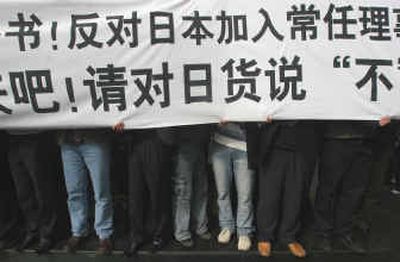Protesters in Beijing bash Japan

BEIJING – Hundreds of young Chinese broke windows at the Japanese Embassy and other buildings Saturday after as many as 10,000 people marched through Beijing calling for a boycott of Japanese goods in a demonstration that appeared to have been sanctioned by the government.
Huge contingents of municipal and military police, many in riot gear, followed the protesters and surrounded the embassy, preventing the crowds from getting too close. But witnesses said police allowed some groups to march past the building and throw rocks. There were also reports of vandalism at the ambassador’s residence and a handful of Japanese restaurants and businesses, but no serious damage or injuries resulted.
The Chinese government rarely approves public demonstrations but appeared to make an exception for the throng of mostly college-age protesters who converged in the city’s high-tech district and for smaller groups that marched from there to the embassy. The protest occurred as relations between China and Japan have grown increasingly strained by a series of disputes over history and territory.
The flag-waving demonstrators urged the rejection of Japan’s campaign for a permanent seat on the U.N. Security Council and called for a monthlong boycott of Japanese goods to protest Japan’s decision to issue new textbooks they say gloss over the atrocities it committed in China during World War II.
Others demanded that Japan give up its claim to a string of small islands in the East China Sea that China considers part of its territory.
As they paraded through the capital, the protesters sang China’s national anthem, “March of the Volunteers,” and chanted slogans such as “Down with Japanese imperialism!” and “Rejuvenate China and raise our national prestige!” Some ripped down advertisements for Japanese products, and others carried a large banner that read, “Selling Japanese products is shameful! Buying Japanese products is shameful!”
One banner in English described Japanese as “evil,” “nasty” and “excrement.”
University students said they surreptitiously organized the protest through the Internet and cellular phone text messages without government approval.
“Let everyone in the world know that we Chinese are still the great dragon of the east,” said a student e-mail that circulated widely in the run-up to the protest.
But the widespread presence of riot police at every protest site, keeping journalists at a distance, closing down streets and ushering through buses for the protesters, suggested that the government welcomed the protest.
China, which carefully controls the Internet, has permitted a recent online petition campaign against Japan’s efforts to win a permanent seat on the U.N. Security Council. Web sites say the campaign has gathered 22 million supporters.
Both China and the United States last week came out against U.N. Secretary General Kofi Annan’s plan for quick enlargement of the Security Council.
Chen Henan, a graduate student at People’s University who described himself as one of the organizers, said he and others asked police two days in advance for permission to stage the march and were told only that police would “watch the situation on the scene” – an answer they took as tacit approval.
“We are happy that the government is supportive,” Chen said, his voice hoarse from shouting slogans. “The police helped a lot in clearing and leading the traffic. It’s high time that our Chinese people should unite together. We hope one day that we Chinese people will be free of fear or pressure from any other country.”
Li Jian, a graduate student at Tsinghua University wearing a headband that read “China Must Win,” said he learned about the march on the Internet and decided to participate because of “deep patriotism.”
“I want to urge all students in Chinese universities to unite and join the protest,” he said.
China’s ruling Communist Party has sought to shore up support by emphasizing its nationalist credentials, and has launched “patriotic education” campaigns directed against foreign countries, including the United States. Japan has often accused China of encouraging anti-Japanese sentiment in its schools and in the state-run media, which routinely censor more sympathetic views of Japan.
In Tokyo, Japan filed a formal protest with the Chinese Embassy about the demonstration and asked that security be tightened around the Japanese diplomatic compound.